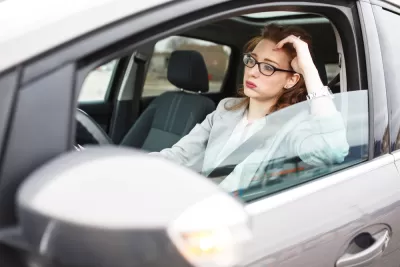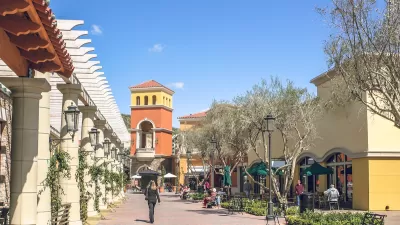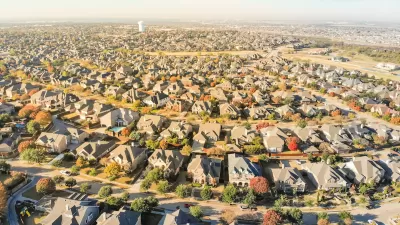Worried that a 15-minute city will restrict your freedoms? Welcome to the alternative.

In a sendup of recent conspiracy theories surrounding the “15-minute city” concept, Devin Wallace, writing on the satirical website McSweeney’s Internet Tendency, presents a new idea: the 15-hour city.
If you’re worried about the government confining citizens to life inside a walkable 15-minute box, then we invite you to the 15-Hour City: a metropolis so sprawling and convoluted to navigate only by car, you’ll need over half the day to accomplish the basic necessities of living.
While opponents of the 15-minute city worry that their mobility will be restricted, Wallace writes, “Here, you can travel anywhere you want, as long as it’s on the handful of roads we afford to maintain with a gas-guzzling car that costs half your paycheck.”
As Wallace explains, “The 15-Hour City believes everything has its place. Houses go in one location, businesses in another, and in between is a dark sea of soul-crushing concrete and asphalt, a sea of inactivity mimicking the lifeless labyrinth we’ve constructed.”
After describing more of the imagined ‘benefits’ of this ludicrous dystopia (and a reality for many Americans), Wallace concludes, “The 15-Hour City represents what we think are all the best qualities of a modern city: a lack of social connections, a profound sense of alienation, and a constant stream of being flipped off by drivers from New Jersey.”
FULL STORY: Introducing the 15-Hour City

Planetizen Federal Action Tracker
A weekly monitor of how Trump’s orders and actions are impacting planners and planning in America.

Maui's Vacation Rental Debate Turns Ugly
Verbal attacks, misinformation campaigns and fistfights plague a high-stakes debate to convert thousands of vacation rentals into long-term housing.

Cuomo Is the Candidate of Both NIMBYs and Developers. What Gives?
In the New York City mayoral race, odd bedfellows align to preserve the housing status quo.

San Antonio and Austin are Fusing Into one Massive Megaregion
The region spanning the two central Texas cities is growing fast, posing challenges for local infrastructure and water supplies.

Charlottesville Temporarily Has No Zoning Code
A judge ordered the Virginia city to throw out its newly revised zoning code, leaving permitting for new development in legal limbo.

In California Battle of Housing vs. Environment, Housing Just Won
A new state law significantly limits the power of CEQA, an environmental review law that served as a powerful tool for blocking new development.
Urban Design for Planners 1: Software Tools
This six-course series explores essential urban design concepts using open source software and equips planners with the tools they need to participate fully in the urban design process.
Planning for Universal Design
Learn the tools for implementing Universal Design in planning regulations.
Heyer Gruel & Associates PA
JM Goldson LLC
Custer County Colorado
City of Camden Redevelopment Agency
City of Astoria
Transportation Research & Education Center (TREC) at Portland State University
Jefferson Parish Government
Camden Redevelopment Agency
City of Claremont





























